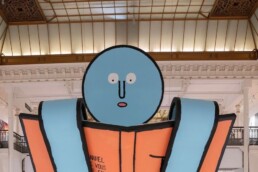Last night the UK suffered it’s third terrorist attack since March. It has only been two weeks since 22 year old Salman Abedi set off a bomb at an Ariana Grande concert in Manchester killing 22 people and injuring more than 60, amongst them many young children. Fast forward to last night and 7 people have been killed so far and 48 people taken to hospitals after 3 jihadis knocked down pedestrians on London Bridge before then attacking innocent civilians enjoying a Saturday evening in Borough Market.
Around the clock reporting will dominate the news and social media in the coming days, and with the ‘One Love’ benefit concert taking place this evening it is impossible to shield children from these horrific events. So what’s the best way to talk to your children to alleviate their fears.
After the horrors of the Paris attack Quartz, Time and Ellen Hendricksen published various guides on how to talk to your children about Terrorism. Below is a brief summary:
Inform them now
“Don’t delay telling your children,” Harold Koplewicz, president of the Child Mind Institute, told Time. “It’s very likely that your child will hear about what happened, and it’s best that it comes from you so that you are able to answer any questions, convey the facts, and set the emotional tone.”
Age appropriate information means your children have accurate information and they know questions on the subject are welcome.
Validate their feelings
If a child says: “I am scared” try not to reply, “there is no reason to be scared.”
“If they’re scared, you can say ‘Lots of kids and even adults feel scared. That was scary,” writes Ellen Hendriksen on Savvy Psychologist. Acknowledging your own fear, or sadness, shows it is okay to be scared.
Ask open-ended questions
More information is better than no information, after a certain age. But too much information can be overwhelming.
Ask kids “what have you heard about what happened in Paris?” and then let them talk. If it’s nothing, you can choose whether to fill in the void so they have a grounding when it comes up. “For kids this age [6-11], knowledge can be empowering and helps relieve anxiety,” Koplewicz told Time.
Remind them about the security all around them
Kids love learning about the police when they are little because they inherently believe in authority. Remind them of all the people in their lives who can protect them: teachers, coaches, babysitters, grandparents, police, security guards, soldiers. Talk about heroes to counterbalance stories of terrorists.
Kids love to divide the world into good guys and bad guys. After an event like Paris, it is important to contextualize the bad guys for what they are: a tiny minority.
To read the full article on the Quartz website click here
For the original Time magazine article click here
Everything you need to know about the One Love concert from the BBC click here
Tonight we will be watching the concert as a family together, dicussing what questions arise and thinking of the individuals and families affected whose lives have been changed irrevocably.
One Love !
Katie xx
Illustration by Manon de Jong
Katie Kendrick
Katie is a specialist in kids’ fashion and lifestyle, editor, consultant, content creator, and owner of Pirouette - a leading resource to the industry.
With a keen interest in both the business and creative aspects of the industry Katie has interviewed buyers, agents, stylists, designers, influencers, covered runway shows, produced trade show reports and curates thought provoking and engaging exhibitions.
She is passionate about good design, creativity and brands that manage to combine this with their environmental responsibility.
Subscribe to Pirouette's monthly Newsletter.
You might also like
February 29, 2024
Jean Jullien’s ‘Paper People’ at Le Bon Marche Rive Gauche, Paris
If you're in Paris make sure to pop into Le Bon Marche, Rive Gauche - there you will encounter two gigantic blue paper people created by Jean Jullien. Art set in a retail space ensuring an enhanced…
October 6, 2021
Pirouette kicks back into action
After being hacked & disabled we're back to bringing the whats what in Kid's fashion & lifestyle! Pirouette has been a little quiet for a while. In part at least because I've been working for…
August 27, 2020
Little Creative Factory AW20 collection ‘Unexpected Poetry’ launches today!
It's been a year since founder and designer of Little Creative Factory made the big move to the even bigger Apple with her lovely family. What a year it has been, there's no stopping this family…
November 12, 2019
Pirouette #CoupDeCoeur: Quiet Town Shower Curtains
The covetable shower curtain is quite the elusive thing to discover, however Brooklyn based Quiet Town's wonderful designs are something a little bit special. Discover Pirouette's #CoupDeCoeur Quiet…
October 21, 2019
Maison Mangostan x Melijoe
Sneaker addicts at the ready! Colourful and covetable footwear label Maison Mangostan and Pirouette favourite kid’s fashion retailer Melijoe have come together to create a very special limited…
September 27, 2019
Photography: The Many Faces of the Grown Man’s Self – Léa Wormsbach
Proving studio shoots need not be boring - a rich deep colour palette can project a luxury aesthetic and stand out from the saturated tendency of standard catalogue shots. The photography of Léa…
September 9, 2019
Reebok x The Animals Observatory 2nd Collab
The Reebok Classic Nylon Sneakers receive The Animals Observatory colour treatment in this their second collaboration and they are available now! View their eye-catching primary colour sneaker…
August 26, 2019
Back to School with Melijoe.com (Editors Picks) AW19 FW19
Melijoe.com Editors Picks AW19 FW19 - Girls As we know everything has to come to an end - even the long playful days of the school holidays must give way to the chime of the school bell. It's not…
July 18, 2019
Barbie at 60 with Laura & Katie
Katie & Laura talk Barbie.Katie invites Laura from Velveteen to the Barbie exhibition held at Pitti Bimbo 88 earlier this year. So how has the iconic Barbie evolved over time, from being an…













